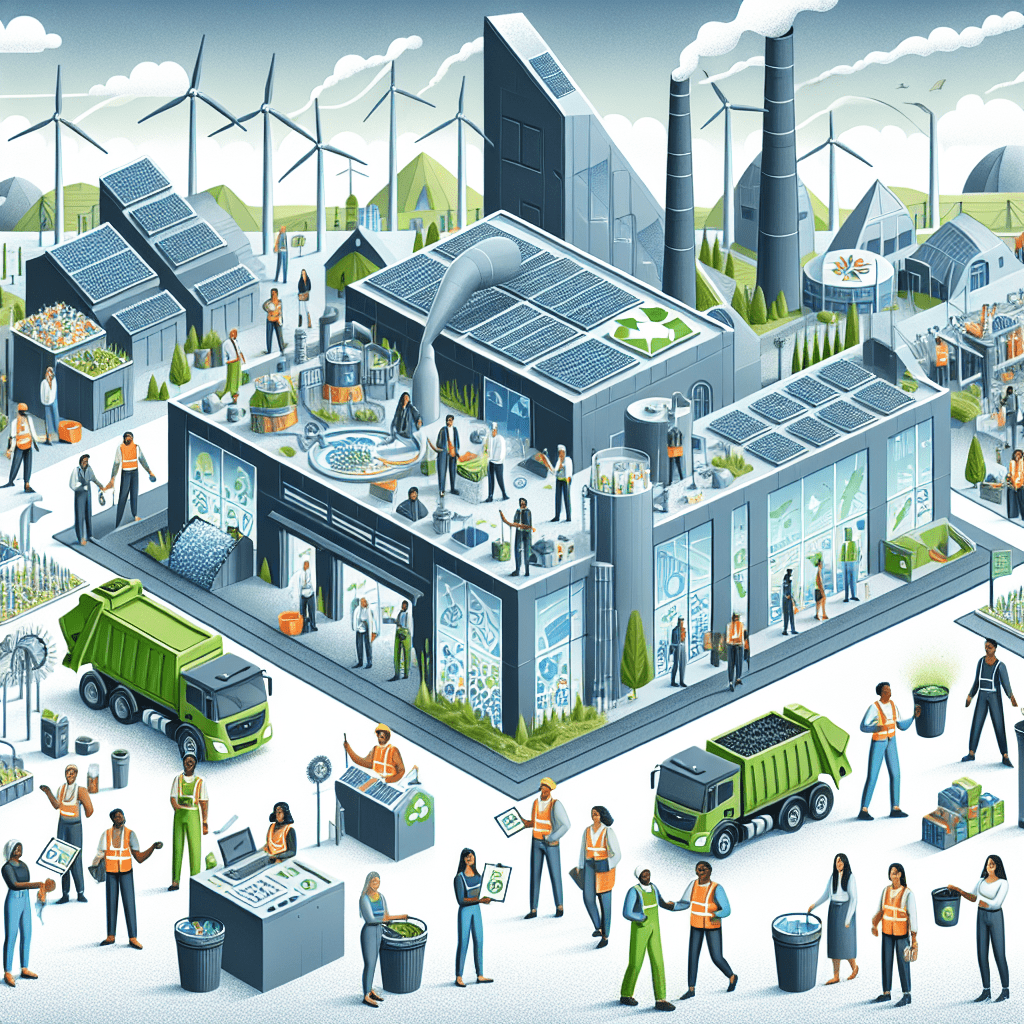“Top Career Opportunities in Waste Management: Building a Sustainable Future”

With the waste management sector a growing industry, there are numerous and rewarding career opportunities that drive environmental sustainability while addressing this global crisis of our time. In light of an ever-compounding waste generation issue, these specialists are pioneering new ways to eradicate the problem and introduce sustainable Solutions. Whether in recycling, waste reduction programs or cutting-edge approaches to advanced waste treatment technologies – jobs in the field of waster management run a broad range from engineering and operations to environmental science and policy development. This field can be entered into by having a job in waste management, allowing people to help reduce the environmental impact of rubbish and also encourage resource efficiency and responsible consumption habits. Moreover, the market is likely to offer significant opportunities due to strict environmental regulations and increasing public awareness about filter media and growing number of government initiatives toward green economies. At its core, waste management represents a rare chance to pivot an existential human problem into a domain of creativity and progress – that is less hype or hogwash than it sounds.
Environmental Engineers
The field of waste management is one that needs environmental engineers’ expertise more than ever because it addresses the matter which may be our most important current issue; going green in sustainable waste disposal and resource recovery. These professionals use their scientific and engineering knowledge of biological, physical, chemical, geology principles required for the development (design), implementation and performance evaluation part of treatment technologies to solve challenges related with management waste in a manner that it will not cause adverse effect on environment. They plan and operate garbage disposal plants, create recycling programs and project how to dispose of hazardous waste. Use site assessments and environmental impact studies to demonstrate compliance with regulations, as well as preventative practices that promote human health and ecosystem protections (Environmental Engineering) This work frequently involves working in conjunction with government bodies, private enterprise or charities to develop policies and practices focusing on waste reduction/ recycling development. Environmental engineers are leading the charge in creating a circular economy by pushing for advancements waste-to-energy technologies and more sustainable practices that benefit everyone, working towards getting our planet greener each day.
Designing waste treatment systems
It is an important sector in waste management which directly or indirectly safeguards the environment as well public health h such career for designing of treatment systems. These professionals design highly efficient ways to recycle, process, and discard waste while having minimal impact on the environment. This role has detailed knowledge on waste streams like Municipal, Industrial and Hazardous wastes along with principles of chemical engineering, environmental engineering and civil engg.
These professionals leverage state-of-the-art methods and ecology-friendly procedures for designing constructional systems, like recycling plants, composting operations or incinerators. It has to abide by the regulatory standards as well and promote environment-friendly techniques. Their research function address both the improved waste treatment and recovery of valuable resources, plus reduced greenhouse gas emissions as well to lower impact on landfills. Reducing the generation of chemical waste and promoting recovery, along with ridding operations of single-use materials, are significant ways these specialist can help improve a circular economy for a more sustainable tomorrow.
Implementing sustainable practices
The enforcement of a recyclable process in waste disposal is seen as the make or break mechanism for creating an environment conscious and resource disposition centered future. An important part of the solution is by harnessing innovative recycling technology to improve material separation and re-use that can help reduce landfill usage while preserving raw resources. Companies are incorporating the circular economy paradigm and turning waste into assets by applying processes such as composting, anaerobic digestion or material re-engineering. With the help of digital tools like IoT sensors and data analytics, waste tracking & management can be improved significantly thereby optimizing collection routes as well reducing carbon footprints. Furthermore, creating public awareness and education campaigns promotes a way of life at the community level around waste recycling and other sustainable practices. There must also be backing from legislators along with incentives to develop innovative ways of recycling & reduce the amount waste we produce. These methods provide waste management careers that are not only good for the environment but also improve economic growth and new technology, leading to more advantageous communities.
Monitoring and mitigating pollution
Both monitoring and mitigating pollution are crucial tasks in the waste management domain that will help to pave a prosperous path for future generations. This field of professionals are concerned with the systematic observation and control of pollutants going to air, water or soil. To monitor levels of pollution and detect potential environmental hazards, they employ cutting-edge technologies such as GIS (geographical information systems), remote sensing, real-time sensors. These trained professionals study trends in data and isolate places that are producing pollution to come up with a plan of action that will control and reduce the emissions.
These include pollution control systems, waste to processing technologies such as pyrolysis and anaerobic digestion, stringent compliance regulatory standards. Moreover, they conduct public education to encourage source reduction and recycling. Careers in pollution monitoring and mitigation bring together the science of measuring environmental harm to guide policy, optimize remediation efforts where necessary, and maintain healthier ecosystems while protecting public health overall – all key features of sustainable development.
Using innovative technologies for waste reduction
Advanced technologies are changing how waste is managed, offering smart solutions that help to reduce the amount of waste and advocate for a more sustainable future. Artificial Intelligence and Machine Learning technologies today can be used to create sorting systems which are far more advanced than those in the 2012, being pretty accurate at separating recyclables from all other trash streams that come into recycling facilities together eventually resulting in crazy high rates of recycled products. In addition, containerised smart waste bins further equipped with sensors can support better collection routes which make even less fuel and emissions for the vehicles to collect waste. Anaerobic digestion and pyrolysis are technologies that will reclaim waste which is otherwise collected in landfills, yet if properly deployed it could be used to generate electrical power as biogas or biochar. Chemical recycling is a further interesting approach that can convert the material into synthetic crude oil or base chemicals, allowing production of virgin quality plastics. Blockchain is also being developed as a waste stream tracking tool to provide certainty and accountability into the circle of manipulating garbage. Hence adoption of these technologies not only reduce the carbon footprint generated from waste but also give birth to new opportunities based on tech-based solutions for management and disposal, paving way towards a sustainable future.
Waste Management Specialists
Waste Management Specialists are on the front lines of sustainability as they help reduce and/or manage waste-and thus protect, mitigate or improve our human-environmental relationship. Professionals in this field create and coordinate waste collection, disposal or recycling programs. They assess current waste management practices, find ways to reduce and improve these methods as well as checking the compliance with environmental laws. They collaborate with businesses, municipalities and the public to encourage sustainable waste practices while diverting usage from landfills in an effort to increase recycling. In addition to the above, Waste Management Specialists will often become involved in educating communities on how they can help improve proper waste disposal and recycling. They strive to reduce waste disposal while using new technologies and practices that can achieve resource recovery. They are literally experts whose capabilities enable you to make this a cleaner, greener and more sustainable world. The impact of their efforts are contributing to a circular economy, turning waste into resources instead of problems.
Developing efficient waste collection strategies
Efficient waste collection strategies are necessary to optimize wastes management system which is vital for sustainable environment. Advanced collection technologies, starting with sensor-enabled bins for real-time fill levels is where successful strategies get their start. This helps in dynamic route planning, which ultimately saves fuel and reduces green house gas emissions. The additional sorting out of recycled materials and compostables as well as hazardous waste provides a means to reduce the amount entering landfills.
Furthermore, we have to promote community engagement and correct practices in dealing with the waste through public campaigns. In addition, partnerships with local governments and private organizations can also streamline resource management and infrastructure building. Automated collection vehicles may increase efficiency and reduce labor costs. Continuous evaluation and adjustments to strategies ensure an adaptable, efficient waste collection system that is resilient in the face of changing technology and waste composition.
In doing so, waste management professionals can greatly reduce environmental impact, aid in resource recovery and help support a community-based sustainability way.
Promoting recycling and upcycling initiatives
Organized recycling and upcycling ventures can play an important role in the waste management industry, paving a way for thousands of career paths which not only enhances environmental sustainability but also helps breakthrough innovative technology on board. Recycling is the systematic collection, processing of waste materials into new products which cut down unnecessary usage by using fresh raw quality. Professionals here can get the job of a recycling coordinator and environmental analyst or waste management consultant. By way of contrast, upcycling makes something old into an aesthetically-advanced or more useful object. These can include creatives like designers, artisans and product developers that make things with their hands using trash to transform it into high-value items. Educators and community outreach managers play a critical role in alerting constituents to upcoming elections, as well. Those driving these initiatives can help individuals contribute to a circular economy on the societal level, en route to becoming dynamic careering change makers.
Educating communities on sustainable practices
Awareness campaigning to the grassroots can have lasting impact on not just waste management but ensures a sustainable future. Because of this, this program efforts to raise awareness on the relevance and urgency to decrease, reuse as well as recycle waste that have high environmental influences. Waste management pros can partner with schools, local governments and community groups to deliver educational agendas that teach homeowners about eco-friendly waste disposal techniques, the advantages of composting and reasons why it is important how we cut down significantly on our plastic usage. Engages multiple absolutely levels through the use of workshops, seminars and digital campaigns – making learning interactive and accessible. Part of the role of a professional in waste management would be to equip communities with an understanding on how wastes can contain harmful substances (knowledge); and also provide them skills on how they could properly handle their own set back towards sustainability (practicality) essentially reducing volume being disposed into landfills directly. This manner of learning not merely assists in conserving natural resources but equips communities to take part and support wider environmental cause.
Ensuring compliance with environmental regulations
Compliance with environmental regulations is an essential component of the work sphere, as this function contributes to the assurance towards zero waste aimed at protecting natural resources and public health. Those working in this field must continuously be informed on the local, state and federal laws designed to manage the disposal of trash and recycling. In the US, for example, one must know legislation such as the Resource Conservation and Recovery Act (which regulates how we manage hazardous and non-hazardous waste). Regular audits and inspections of compliant waste processing procedures are required by compliance officers and environmental managers. They also handle all necessary documentation and reports that need to be submitted to government agencies. This system encourages compliance and avoidance of fines or lawsuits. In addition, sticking to legal requirements ensures that these professionals would encourage sustainability through the increase green movement and reduce carbon footprint of waste disposal, which could provide communities with cleaner environment as well as proper information for public trust in terms of their project to manage wastes responsibly. This will pave the way for a better and more sustainable future of all.
Renewable Energy Technicians
One of those ways in which we can address the waste management issues is through renewable energy, and for that to work efficiently someone also needs to be there who works with it – an example being Renewable Energy Technicians – as they help convert all this into a better source of sustainable electricity! These pros work on the installation, maintenance and repair of biogas systems that convert organic waste into an alternative energy source. They are also known to typically partner with anaerobic digesters, which breakdowns organic matter like food waste and agricultural residues (and even sewage sludge)generating methane gas. The biogas produced can then be utilised for electricity or heat production, therefore through that, also the need and use of fossil fuels are reduced as well greenhouse gas emissions.
In addition, renewables technicians play a crucial role in waste-to-energy (WtE) plants that burn solid trash to make electricity. Their knowledge of these systems ensures that they operate in the most efficient, and safe way possible to reduce emissions as much as feasible while maximizing energy output. Their task, in the final analysis, is to offer an approach that changes how waste disposal happens while ensuring it remains as green and renewable friendly as possible which helps us all have a more sustainable future by incorporating green energy solutions into this segment of society (waste):
Converting waste into energy
The waste-to-energy segment overlaps with vital parts of the future landscape in sustainable garbage management. It is a waste treatment process that create energy in the form of electricity or heat from non-recyclable trash, as known as Waste-to-Energy (WtE) which through treatments such incineration, gasification and anaerobic digestion. Individuals in this sector work to better utilize those technologies so as not to clog up landfills, decrease emissions and help reduce waste one ton at a time.
Employment in Waste-to-Energy extends to different areas like Engineering, Environment Sciences and project management among others. Design and operation of WtE facilities to be managed by engineers;margin: 0. Environmental scientists also review the environmental impacts, and they create plans to prevent any serious impact on them as well. The implementation of WtE projects is facilitated by project managers who ensure all stakeholders are on the same page and sustainability goals can be met.
The whole waste management industry is involved in converting the same into energy while it solves issues around disposal of wastage, enabling contribution to filling gap towards global demand for sustainable solutions which can be long term career and at least a hopeful one withand also way others are working more sustainably.
Operating bioenergy plants
The operation of bioenergy plants is also a booming career opportunity in the waste management industry, due to sustainability and renewable energy trending. It refers to plants that convert organic waste streams (such as agricultural and food residues) or other biodegradable resources into useful energy carriers: e.g.;biogas, bioethanol, biodiesel etc. Roles in this field include manufacturing floor management, process engineering and environmental compliance as well research and development. Professionals are tasked with managing day-to-day operations; optimizing energy generation process, meeting regulatory requirements and incorporating new technologies to increase efficiency as well sustainability. The increasing number of bioenergy plants circumvents is being integrated with the collection and sorting systems for domestic waste – less dependence on fossil fuels, fewer greenhouse gas emissions, more sustainable very circular economy principles… turning trash into dope resources! Therefore, professionals engaging bioenergy plant processes contribute to environmental preservation and energy sovereignty regarding the blueprint of resilient needs. This field provides challenging, lucrative employment opportunities for people interested in green technology and environmental activism.
Maintaining waste-to-energy systems
Waste management, and specifically waste-to-energy (WtE) systems are an important sub-point to keep in mind for those creating solutions that will one day build a more circular future. WtE plants employ several different processes to convert non-recyclable waste materials into heat, electricity or fuel. Regular maintenance on these systems keeps them running effectively and safely resulting in lowered waste transported to landfills for disposal, along with lowering of greenhouse emissions. Systems must be maintained by technicians / engineers, systems monitored for correct operation and necessary repairs undertaken to prevent downtime – keeping up with emission standards. These roles require a high level of mechanical and electrical engineering skill as well knowledge of environmental regulations. Professionals who are able to effectively cultivate WtE systems can therefore have a large impact on energy sustainability and resource recovery, with the possibility of abundant career opportunities within an ever-changing waste management industry.
Advancing research in waste energy conversion
Scientific progress on waste energy conversion is an essential aspect of mitigating the global issue of a growing burden in waste and breaking new ground for building environmental sustainability. Thought of thinking and researchers are working on latest technologies which can change the waste products into renewable energy sources. Examples of such processes are anaerobic digestion, pyrolysis and gasification where organic waste is converted to biogas or solid/ liquid fuels. This is to improve the efficacy and scalability of these processes, so as the energy yield ([Wte]) can be increased (thus also decreasing environmental impacts that are associated with this waste-to-energy [waste refines into by-products] process) regarding WtE technologies. In addition, utilising material-lead development can help us couple these thermal conversion routes that will allow for maximum energy content to be extracted from waste and also reduce emissions. In this area, breakthroughs are dependent on funding and partnerships between academic institutions to the private sectors onto government entities. Finally, the opportunities for waste energy conversion to be utilised is nothing short of ground-breaking; it helps underpin a move away from landfilling while stepping up in scale to support both circular economy initiatives and global energy transition ambitions towards more sustainable paths.
Sustainable Product Designers
As it is clear that the Waste Management Sector, which will be generated by Sustainable Product Designers plays a primary gooder for establishing this Ecological conscience. The people behind these efforts, the professionals who create sustainable products are focused on not only creating good looking and functional pieces, but ones that also check one more box – eco-friendly. They use circular design principles to reduce waste and make products easy-to-disassemble, so they can be recycled or reused after their end-of-life. Through the adoption of sustainable materials, a focus on waste reduction and extending product life-cycle they reduce the overall ecological footprint. They work with engineers, manufacturers and marketers to help seamlessly integrate sustainable design practices through all phases of production. Sustainable Product Designers, through design thinking endeavors, focus on driving waste reduction and resource efficiency as well as raising awareness for greater de-carbonization in sectors including but not limited to consumer electronics or fashion. At the end of the day, their work is critical to improve waste management and promote a transition toward a circular economy in order to achieve sustainability.
Creating eco-friendly packaging
Eco-friendly Packaging: A Golden Career Opportunity in the Waste Management Industry and preparing future for a sustainable world 1. The purpose of this role is to create and deliver packaging that reduces the environmental footprint through sustainable sources, combined with expert knowledge in best practice packaging technologies. Anyone who gets into this line of work will help product developers, material scientists and environmentalists develop designs that make products easier to break down for recycling or less harmful to the environment.
This will also involve developing packaging which use less resources, are more easily recycled and compostable through research into biodegradable materials such as plant-based plastics. Another important initiative is the implementation of closed-loop systems, which are systems used to recycle packaging materials continuously. This means the potential beneficiaries of careers in eco-friendly packaging includes those across industries, from food and beverage to cosmetics.
Working in and around eco-friendly packaging allows professionals to work where they can have the most positive impact on sustainability, while taking advantage of a market that is rapidly increasing due to consumer desires for greener options; thus putting individuals or companies at the forefront of environmentally responsible innovation.
Designing products from recycled materials
A wormhole in the lucrative career market of waste management, product development from recycled materials is an essential conveyor belt on our road to sustainability. This emerging field is centered on converting waste into useful outputs to reduce the use of virgin materials and achieve sustainability. Those who work in this field use both aesthetic creativity and technical know-how to create items that serve a purpose while being sustainable. The world has endless opportunities on this topic, from turning plastic bottles into fashion to scrap metal into furniture. The recycling processes are designed to work in collaboration with engineers, sustainability experts and manufacturers so that they know where EOL vehicles go from there. Our work turns rubbish into profits, creating markets for new products made from recycled goods and thereby fostering a closed-loop cycle where produces enjoy longer life spans and waste is minimised. It is a field for those who believe in sustainable development, innovation and that they can contribute with their precious little piece of work to address the issues raised by global waste challenges.
Reducing product life-cycle waste
Waste stream management, Early life-cycle waste reduction is another important career opportunity in the field of resource conservation and preservation that (to be relevant) must minimize generation at each stage of a product’s life from inception to disposal. They build and action strategies to increase resource productivity, promote sustainable materials & circular economy (keeping products and material in use for longer) practices. It could mean creating things that last longer, are more easily mended or used by someone else after you’re done with them,:/ 74 cm repair friendly and recyclable in the middle of usage upcycling entity like some type breeding object at /34-24 thus for example other consuming data: smaller than all space flats. The experts also work with sectors for the optimization of supply chains and to lower their carbon ensemble. Because these positions put waste elimination at the heart of product design and lifecycle management, they are key to building an environmentally friendly future. They lead not just to less waste but also an effective use of resources and diminished pollution which helps combine economic growth with environment protection.
Promoting circular economy principles
One of the essential cornerstones in waste management will be promoting circular economy principles and these offer promising career growth opportunities with a lens towards sustainability. Rather than the linear economic model of “take, make, dispose,” it is a restorative and regenerative system. This area deals with improving resource efficiency, designing for long life, reuse and recycling as well as advanced waste recovery systems; experts in this field.
This is where roles like Circular Economy Analysts, Sustainable Product Designers and Resource Recovery Specialists are becoming more necessary. They require creative thought about how to reduce waste and environmental impact, creating loopback solutions so materials can be endlessly reused. Circular economy advocates help to drive systemic change, encouraging collaboration across industries, policymakers and communities – creating a more resilient and sustainable future for all. Due to this particular thing working in the favour of sustainability careers, jobs regarding it not only help reduce ecological footprint but also enable new business models and thus economic growth which even makes if completely profitable.
So what have we concluded?
To sum up, the professional challenges of waste offers varied career opportunities for personal development while contributing to sustainability. Global waste production is ever-increasing, so the demand for new solutions and talented professionals who can navigate these obstacles will only continue to grow. Waste management careers span numerous positions including environmental engineers, waste treatment operators, sustainability consultants and recycling coordinators. These roles have the key function of minimising environmental footprints, protecting resources and making sure that all groups are practicing eco-friendly behaviours. Recognising the ever-growing need for sustainable waste management, this industrial sector can offer an exciting and fulfilling career in environmental stewardship. By taking advantage of these ancillary opportunities, they can help clean up the planet (and build a better career in an industry that plays a vital role to our future).






